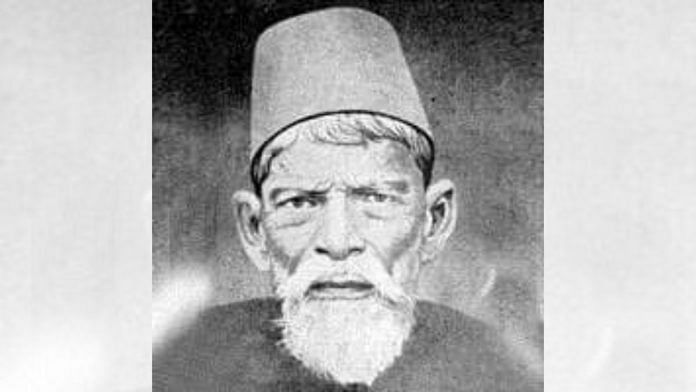New Delhi: “Hum aah bhī karte haiñ to ho jaate haiñ badnām, vo qatl bhī karte haiñ to charchā nahīñ hotā” (Even if I make a tiny sound, I get maligned, but she can get away with murder), tweeted Washington Post journalist Rana Ayyub in response to BJP stalwart L.K. Advani’s post-Ayodhya verdict statement “I stand vindicated”.
The couplet tweeted by Ayyub was penned by 19th-century Urdu poet Syed Akbar Hussain Rizvi, popularly known as Akbar Allahabadi. His work remains significant even in today’s political atmosphere.
Distinguishing himself from his contemporaries, Akbar Allahabadi is well known for his satire, giving a “humorous touch even to the serious themes of love and politics”.
Danish Husain, actor, poet, dastango, and theatre director, tellsThePrint, “[Allahabadi] broke away from the traditional metaphors of love, wine, estranged lover, existential angst, and introduced a certain political immediacy and currency to Urdu poetry, a style not heard before him.”
Also read: A birthday tribute to Mirza Ghalib, the poet who took Urdu to the zenith of glory
When real life didn’t match the page
Born Syed Akbar Hussain in Bara, just outside Allahabad, on 16 November 1846, the Urdu poet received his primary education at home, before his mother moved to Allahabad.
While a clerk in the Railway Engineering Department, he passed his law exams and worked his way up to becoming a sessions court judge. Most of his poetry is a commentary on the Muslims in India. Widely acknowledged now as a master of satire, he was very vocal of the cynicism of colonial India’s political leaders and their hypocrisy. He wrote:
Qaum ke gham mein dinner khaate hain hukkaam ke saath
ranj leader ko bahut hai magar aaraam ke saath
(They cry over the community’s woes with rulers over fine dinners
the leaders talk of sorrows but in comfort)
Having witnessed the transition from the decline of the Mughal court to the rise of the modern Muslim nationalism, he critiqued the passing of the old and the beginning of the new world order. Akbar’s work reflects that he was vehemently against Westernisation. However, his life didn’t mirror this ideology.
Given that he was a senior member of the British official establishment, his continued attack on adapting to the British way in many spheres was a direct contradiction to the choices he made in his personal life. He even sent his son to study abroad for higher education. In fact, Akbar was even known for weaving English terms into his poetry:
Chhod literature ko apnī history ko bhuul jā
shaiḳh-o-masjid se ta.alluq tark kar schōl jā
chār-din kī zindagī hai koft se kyā fā.eda
khā double roTī clerkī kar ḳhushī se phuul jā
(Forget about studying literature or even history
Break all your relations with Shaikhand mosque, go to school
Life is too short, there’s nothing to gain by worrying
Eat bread, work as a clerk, and swell with happiness)
“He was sharp enough to grasp the influence of the English language, and understood very early that English words will enter our lexicon soon and will be in daily use. Perhaps he was experimenting with his poetry anticipating this change,” says Husain.
Also read: R.D. Burman’s magic can make everyone from a grandma to an expat sing along
An advocate of communal harmony
The Khilafat Movement, which began in 1919, started falling apart due to the rise of Mahatma Gandhi and the ideology he stood for. This dilution of the movement deepened the divide between Hindus and Muslims, many of whom wanted to align themselves with the Muslim League. However, Akbar Allahabadi stood for brotherhood between the two and wrote many verses expressing the same.
Hindu wo Muslim aik hain dono yani ashiyaae hain
Ham watan, ham zuban, wa ham qismat
Kyon na keh doon ki bhai bhai hain ?
(Hindus and Muslims are one, friends They belong to the same country, speak the same language, have a common destiny
So why shouldn’t I say they are brothers?)
He wrote many such couplets and poems, pushing for peace between the two communities. These repeated attempts at a Hindu-Muslim unity led to rumours that Akbar was being bribed by the Hindus and had, perhaps, fallen into the trap of drinking alcohol, which is prohibited in Islam.
It is in this context that his famous ghazal — Hangama hai kyun barpa thodi si jo pi li hai — should be read — as a response to those allegations. But Allahabadi was well known for conveying a deeper meaning that one would only get by reading between the lines. Sample this bit of the ghazal:
us mai se nahīñ matlab dil jis se hai begāna
maqsūd hai us mai se dil hī meñ jo khiñchtī hai
(Useless is the wine that is a stranger to my heart)
(I seek the wine that springs forth from my own heart)
Rana Safvi, historian, columnist and translator, writes, “[This verse] is a reference to the intoxication of power, resulting in the hateful divisiveness of those days, and leading ultimately to Partition. Thankfully Akbar didn’t live to see that day.”
The satirist’s modern syntax and freshness of thought made him an urban poet in the truest sense. Even though his critics often wrote him off (writing satire was not a profession that was respected in literary circles), the gravitas of what he conveyed remains, while making the reader chuckle.
Critic A.A. Suroor said, “One may not agree with his ideas, but one can’t help smiling at his verses, and being often obliged to give serious thought to them, and that’s what he aimed at.”
Speaking about what the poet would have made of the India of today, Husain says, “Never before has the real become farce as it has in our times. He would either have bloomed or driven himself to despair.”
Also read: Bahadur Shah Zafar, the last Mughal who would rather have been a poet



